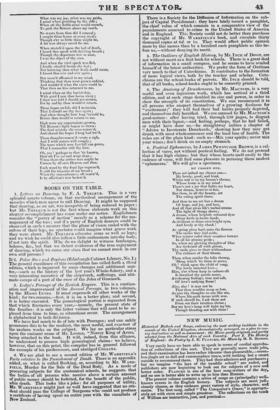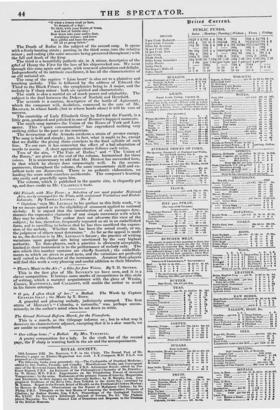NEW MUSIC.
Historical Ballads and Songs, embracing the most striking incidents in the annals of the United Kingdom, chronologically arranged, on a plan to con- vey instruction as well as amusement; the Music partly original, and partly selected from the National Airs of each Country. Part .r. The History of England: the Poetry by J. R. PLANCUE, the Music by H. R. BISHOP.
Very rarely have we been able to speak in terms of cordial approba- tion of collections of this sort. They are generally mere trade jobs, and their examination has been rather irksome than pleasurable,—sense- less jingle set to dull and commonplace tunes, with nothing but a smart outside to recommend them. They had their admirers and purchasers; but we imagine "the lays of the twaddle school" are ended, and publishers are now beginning to look out for subjects of a new and better order. PLANCHE is one of' the best song-writers of the day, and no one is better able to write up to him than BISHOP. The present volume contains a series of songs on (principally) well. known events in the English history. The subjects are most judi- ciously chosen, as they embrace great variety of style, character, and metre. The first song, called "The Conqueror's Grave," is appropri- ately set with stem and simple grandeur. The reflections on the tomb of 'William are instructive, just, and poetical-
"0 what a lesson read ye here, Ye despots of a day ; Ye idols, with your fronts of brass, And feet of brittle clay I Bow down into your native dust.
Ambitious worms ; and know How pitiful and base the sum • Of all ye grasp below."
The Death of Rufus is the subject of the second song. It opens with a lively hunting strain; passing, in the third verse, into the relative minor ; and ending (the same measure being preserved throughout) with the fall and death of the king. The third is a beautifully pathetic air, in A minor, descriptive of the grief of Henry the First for the loss of his shipwrecked son. We went through this song again and again, with renewed admiration and delight. Independently of its intrinsic excellence, it has all the characteristics of an old national air.
The song of the captive " Lion heart" is also set to a plaintive and touching melody. This is followed by the address of Edward the 'third to the Black Prince ; the symphonies being in A major, and the melody in F sharp minor : both are spirited and characteristic. The sixth is also a martial air of much power and originality. The subject is the duel between the Dukes of Norfolk mid Hereford.
The seventh is a cantata, descriptive of the battle of Agincourt; which the composer will, doubtless, commend to the care of Mr. BRAHAM, in whose hands (but in whose hands alone) it will be sure of Success.
The courtship of Lady Elizabeth Grey by Edward the Fourth, is a little gem, produced and polished in one of BISHOP'S happiest moments.
The ninth song narrates the Union of the Roses of York and Lan- caster. This "quiet consummation" has engendered nothing very striking either in the poet or the musician. The destruction of the Armada awakens a strain of greater energy. The song is bold and simple ; just, in fact, What it ought to be, except that we dislike the giving three crotchets to the final syllable of each line. To our ears it has somewhat the effect of a bad adaptation of words to music. A short appropriate chorus follows each verse.
Two of the airs, "The Fate of Rufus," and " The Union of the Roses," are given at the end of the volume, harmonized for three Voices. It is unnecessary to add that Mr. BISHOP has succeeded here, in that which he always does surpassingly well. In the accom- paniments, throughout the volume, the same consummate skill and ex- cellent taste are discovered. There is no pedantic elaboration, no loading the score with ceaseless accidentals. The composer's learning sits easily and gracefully upon him. The volume, which is published in the quarto size, is elegantly got up, and does credit to Mr. CHAPPELL'S taste.



























 Previous page
Previous page